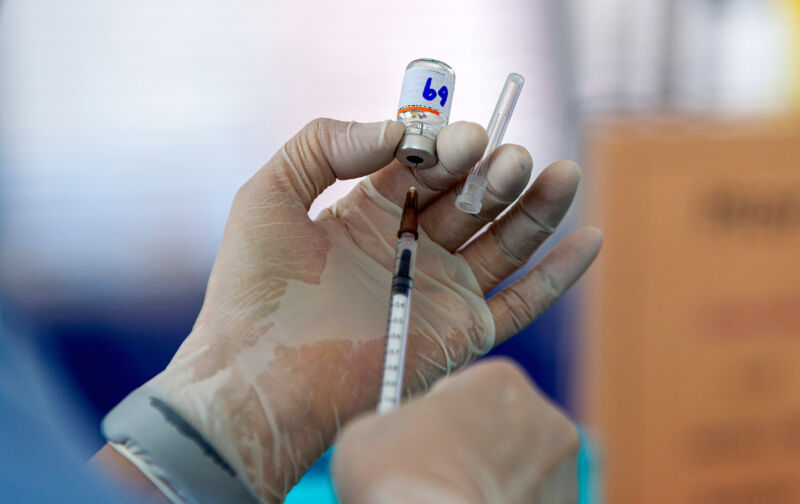COVID-19 vaccines —
With vaccines widely available, Moderna wants to be paid for its earlier work.

Enlarge / Moderna states that it doesn’t want to halt production or distribution of Pfizer/BioNTech’s vaccine, but it does want to be paid a license for its claimed patents.
Getty Images
Now that the vaccine race is over and shots are broadly available, Moderna has filed suit against Pfizer and BioNTech, claiming they infringed on Moderna’s mRNA patents from 2010-2016.
Moderna, a Massachusetts-based firm, filed suit against New York-based Pfizer and BioNTech in Düsseldorf, Germany, related to the firms’ joint Comirnaty vaccine and its similarities to Moderna’s Spikevax. Moderna claims in the suit that it doesn’t want to halt vaccine production. The suit also doesn’t seek damages for sales before March 8, 2022, sales in lower or middle-income AMC 92 nations, or sales where “the US Government would be responsible for any damages.”
In a statement announcing the suit, Moderna stated that it expected Pfizer and BioNTech to “respect its intellectual property rights” and “consider a commercially reasonable license” to sell vaccines outside those accepted conditions, but the firms failed to do so.
“Our mission to create a new generation of transformative medicines for patients by delivering on the promise of mRNA science cannot be achieved without a patent system that rewards and protects innovation,” Moderna’s Chief Legal Officer, Shannon Thyme Klinger, said in the statement. Moderna did not specify its claim for damages in the suit. A Pfizer spokesperson told The New York Times that the company was “surprised by the litigation.”
Moderna claims it started work on its “mRNA technology platform” in 2010, and patented it in 2015 and 2016. This work allowed for record-fast vaccine production, Moderna’s CEO Stéphane Bancel said in the statement.
Vaccines based on mRNA use a fatty nanoparticle wrapping to deliver a slice of genetic code—”messenger RNA—from viruses. In the case of SARS-CoV-2, the blueprint of the virus’ spike protein is conveyed. With that bit of code, the body can train the immune system to target the spike protein, creating potent antibodies to fight off an infection.
Moderna’s patent claims are tied to chemical modifications made to the mRNA in Pfizer and BioNTech’s vaccine, and the lipid (fatty) coating.
mRNA-based vaccines have proven effective against COVID-19 and could be the next leap forward for influenza and other vaccinations. Moderna demanding a license for all non-AMC-92, post-March-2022 mRNA vaccines could hamper that. The company has previously received criticism for dragging its feet on sharing its vaccine formula for global distribution and even won a “2020 Shkreli Award” for goosing the price of its vaccine after receiving $1 billion in government funding.
But pharmaceutical giants suing one another over lifesaving innovations isn’t uncommon. Nor are such lawsuits coming after public funding. While Moderna did, as The New York Times points out, accept $2.5 billion in taxpayer money to develop its vaccine, that’s separate from the patents underlying the delivery mechanisms, which Moderna claims go further back.
Medical journalist Matthew Herper says in STAT (paywall) that pharmaceutical patent litigation “proceeds at a glacial pace” and that mRNA’s development is inherently fraught. Moderna, Pfizer, and BioNTech are all being sued by a company across town from Moderna, Alnylam, over the fatty nanoparticle work. And the origins of mRNA delivery may go further back, still.
Derek Lowe notes in Science that there is “almost never an example of a breakthrough biopharma technology that does not end up setting off a flurry of patent lawsuits.” Moderna had to license an RNA modification, after initially claiming it had invented its own. Lowe also notes that Moderna is currently being sued by two other companies claiming that their own lipid nanoparticle patents were infringed.
While it may be business as usual for huge pharmaceutical companies, seeing the companies credited for beating back the tide of coronavirus fighting over licensing rights in court—however many carve-outs they promise—could be harmful to vaccination efforts and public perception of health care. And while the public investment in the vaccine race may not be directly related to this lawsuit, it doesn’t look great to be reminded of the gap between public health and the private companies that often benefit.
(Update 1:12 pm: Added link and context from Derek Lowe’s Science post, and quote from Pfizer spokesperson given to The New York Times.)


